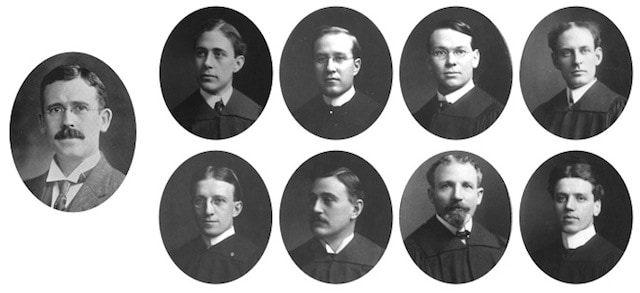
The history of Alpha Omega Alpha Honor Medical Society (AΩA) and its founder William Root emphasizes a distinguished heritage in medicine that embodies the characteristics of truthfulness, morality, virtue, purity, and complete dedication to caring for people, improving health, and serving society. Above all it is the obligation of worthiness to practice excellent medicine with humility, self-effacement, charity, and with the objective to achieve high moral professional stature.
AΩA was founded in 1902 by medical student William Root and colleagues, at the Chicago College of Physician and Surgeons (later named the College of Medicine of the University of Illinois). Root wrote in 1909 that “it was the lack of interest in scholarly attainment among medical students that led him to begin AΩA.” He and other students noted that “honesty was conspicuously absent, and behavior in the halls and classrooms was rough and boorish.” They were very concerned that so many of their fellow students who sought to become doctors “seemed crude and chaotic. Cheating on examinations was repugnant, rough housing was distasteful.” Root conceived of the idea of AΩA to encourage among the students “personal honesty and the spirit of medical research.”
When AΩA was established, medical schools were for-profit and proprietary. Medical students were selected based on their ability to pay the tuition, and the faculty were largely interested in enrolling paying students. Department heads were chosen by who could buy a substantial block of stock.
In July 1902, Root and a group of his scientifically-minded friends met to think about the problem they viewed as inadequate preparation for becoming a medical doctor. Fellow student Ernest S. Moore (AΩA, University of Illinois, 1902) wrote, “in the summer of 1902, I was sitting on the steps of the old College building. It was almost time to start the grind when Root came out of the building and sat down beside me to tell me about a plan he had in mind to organize a medical honor fraternity (society) patterned after the lines of Phi Beta Kappa.”
Moore, convinced by Root’s ideas, provided a list of fellow students he believed thought the same way and should be invited to membership. Root presented his proposed society to these students August 25, 1902, and on September 27, 1902, 28 medical students met at the Bismarck Hotel in Chicago to ratify a constitution drafted by Root and to induct the society’s first members. At that same time, Root proposed the Society’s motto, “Be Worthy to Serve the Suffering.”
Selection for membership emphasized scholarship and appropriate professional demeanor. All agreed that race, color, creed, gender, and social standing should never be barriers to membership, and stated so in an early Constitution:
Women are admitted on the same terms as men. In fact, race, color, creed, sex, and social standing form no barrier to membership, the only qualifications necessary being scholarship and character.
In 1906, AΩA led the nation in ensuring equality in its membership by inducting its first female member.
AΩA was Chartered in the State of Illinois in 1903 with Articles of Incorporation. The founders of AΩA were able to rapidly persuade leaders at medical schools aspiring to high standards to become part of the organization and establish AΩA Chapters in their schools.
William Root was a humble man, dedicated to the care of others. When he died in April 1932, his only wish for his burial was that his headstone state that he had founded AΩA. He is interred at East Lawn Cemetery, Ithaca, NY, with his wife Anna at his side. His headstone reads simply, “Root, William W., Founder of AΩA, 1867–1932.”
AΩA has stayed true to its founding principles, especially the AΩA motto: “Be worthy to serve the suffering.” An interdisciplinary membership organization with a distinguished history of service to medicine, the profession, society, and patients, AΩA’s mission statement is as it was originally written in 1902:
Alpha Omega Alpha—dedicated to the belief that in the profession of medicine we will improve care for all by:
- Recognizing high educational achievement;
- Honoring gifted teaching;
- Encouraging the development of leaders in academia and the community;
- Supporting the ideals of humanism; and
- Promoting service to others.
Today, AΩA has 135 Chapters in medical schools across the country, and more than 200,000 members, including 55 Nobel Prize winners in physiology, medicine, and chemistry, and more than 75 percent of medical school deans.
In 2020, AΩA amended its Constitution to emphasize the characteristics of excellent physicianship – trustworthiness, character, caring, knowledge, scholarship, proficiency in the doctor-patient relationship, leadership, compassion, empathy, altruism, and servant leadership.
As those who have gone before us so eloquently put it, it is our charge to “foster the scientific and philosophical features of the medical profession; look beyond self to the welfare of the profession and of the public; cultivate social mindedness, as well as an individualistic attitude toward responsibility; show respect for colleagues, especially for elders and teachers; and foster research and in all ways to ennoble the profession of medicine and advance it in the public opinion.”


